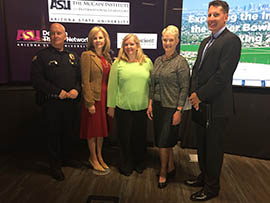Cronkite News has moved to a new home at cronkitenews.azpbs.org. Use this site to search archives from 2011 to May 2015. You can search the new site for current stories.
Study: Sex trafficking increase not directly influenced by Super Bowl
PHOENIX – An increase in sex advertisements and solicitations in the Phoenix area can’t be directly linked to the 2015 Super Bowl but is part of an ongoing problem with sex trafficking, Arizona State University researchers said Monday.
A two-year study conducted by ASU’s Office of Sex Trafficking Intervention Research looked at the period around the 2014 Super Bowl near New York City and this year’s Super Bowl in Glendale. It found that the Phoenix area had a 30 percent increase in sex ads from the same period in 2014.
However, the study found that North Jersey/New York actually saw more sex ads this year versus 2014.
The study also measured the industry in the San Jose area, which will host the 2016 Super Bowl.
At a news conference, Director Dominique Roe-Sepowitz said the Office of Sex Trafficking Intervention Research focused on both supply and demand in the sex market. In measuring the number of daily sex ads in the days around the Super Bowl, the study found what researchers called a significant increase in the Phoenix area: average daily ad volume of 274 this year versus 191 in 2014.
“The market really grew around the time of the Super Bowl,” she said. “People were coming into Phoenix to sell sex.”
The researchers also posted decoy ads to measure responses. According to the study, more than 70 percent of the responses to decoy ads in Phoenix came from local phone numbers. While that suggests a lot of the buyers are from Arizona, researchers found that more than 60 percent of the sellers were from out of town.
Roe-Sepowitz said the best way to combat the problem is to focus on decreasing demand in the sex industry, and that requires extensive research into johns’ buying patterns.
One effort to combat sex trafficking is through the Cities Empowered Against Sexual Exploitation, or CEASE, Network, a national project launched by the group Demand Abolition to combat demand. Phoenix is one of 11 cities in the CEASE Network, which aims to decrease demand by 20 percent in the next two years.
“One of the most important pieces of the CEASE Network plan is that it isn’t just about people who are buying today, it’s about people who are thinking about buying tomorrow,” Roe-Sepowitz said.
The study was funded by The McCain Institute for International Leadership at ASU. Cindy McCain, co-chair of the Arizona Governor’s Task Force on Human Trafficking, said it’s important for law enforcement agencies to work together to combat sex trafficking across the state.
“The ease of buying a human being on the Internet has become easier. We can’t track it as well,” she said. “There’s a whole issue with now getting our really good Internet guys on this and being able to not only track it but find out how to stop it.”
FBI Special Agent George Stewart, who works with the Phoenix Human Trafficking Task Force, said recent efforts by government and law enforcement to combat the problem are going to continue beyond the Super Bowl.
“We’re not gonna go away,” Stewart said. “Our task force is stronger than ever.”
Cindy McCain opened press conference on Super Bowl sex trafficking study #CNAZ @cronkitenews pic.twitter.com/MCal823fHA
— Karla Liriano (@karla_liriano) February 23, 2015









